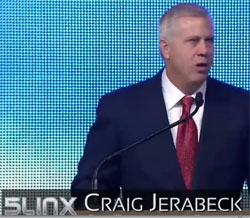5Linx co-founder alleges financial fraud
![]() Last September Craig Jerabeck resigned as President and CEO of 5Linx. Following his departure, Jerabeck signed up with Paycation.
Last September Craig Jerabeck resigned as President and CEO of 5Linx. Following his departure, Jerabeck signed up with Paycation.
Paycation was founded in 2014 and operate a recruitment-driven travel niche opportunity.
5Linx went on to file a lawsuit against Jerabeck, alleging he ‘breached a contractual pact by enticing a number of 5Linx top employees to join him at‘ Paycation.
 Purportedly Jerabeck (right) went around telling 5Linx affiliates that the company was in “dire financial straits”.
Purportedly Jerabeck (right) went around telling 5Linx affiliates that the company was in “dire financial straits”.
5Linx provided testimony from top affiliate Barry Johnson, who claims Jerabeck offered him a backroom deal.
Barry Johnson, said in an affidavit that Jerabeck tried to convince him to leave 5Linx in late September.
Jerabeck allegedly told Johnson that 5Linx owed MontBriar chief executive Jeremy Monte “millions of dollars” and that Monte had plans to acquire 5Linx if the company failed.
Jerabeck “explained that he was offering me a more lucrative deal than he offered to other 5Linx representatives because of my background and experience, and because if I came to Paycation, many other 5Linx representatives would come with me,” Johnson said in the affidavit.
Jerabeck responded by claiming he did not breach his contract. He maintained that 5Linx affiliates affiliates ‘are not traditional “employees” but are, instead, independent contractors‘.
A decision last month didn’t stipulate on whether Jerabeck indeed solicited 5Linx affiliates, but nonetheless prohibited him from doing so.
Jerabeck’s 2006 “non-disclosure, non-solicitation” agreement did restrain him from soliciting 5Linx employees for a year after leaving the company.
State Supreme Court Justice Matthew Rosenbaum blocked Jerabeck from “soliciting, servicing or otherwise doing business with any 5Linx accounts, customers or vendors that he called upon, sold products to, or otherwise serviced.
To what extent the ruling has effected Jerabeck’s Paycation business is unclear.
The discourse of 5Linx’s case against Jerabeck meanwhile saw serious allegations of financial fraud made.
Jerabeck alleged that Jason Guck and Jeb Tyler ‘lied to would-be lenders about the company’s financial standing‘.
The two “were attempting to secure additional financing for the company through the provision of a false number … to prospective lenders and investors and pressuring me to participate in their misconduct,” Jerabeck said in an affidavit.
In particular, he alleged, the two wanted him to claim that what is known as EBITDA (earnings before interest, taxes, depreciation and amortization) was $5 million when it was instead about $2 million.
“Moreover, even though I objected to the use of the false EBITDA number, 5Linx used my signature stamp without my authorization to apply for credit at numerous financial institutions,” Jerabeck alleged.
Guck and Tyler have dismissed claims of deception, insisting that they honestly believed ‘an EBITDA figure of between $4 million and $5 million was likely for the year.‘
“However, Mr. Jerabeck had a much bleaker perspective on the company’s cash flow and preferred using the lower EBITDA number for 2015,” Guck said in an affidavit.
They disagreed with Jerabeck, who claimed that 5Linx “was not making any money,” Guck wrote.
Whether anything further comes of the allegations remains to be seen.
If a company lies to a financial institution on a formal applications for credit, it could be open to civil litigation from the lenders and could also face federal criminal charges.
Jerabeck’s attorney meanwhile informed the Democrat & Chronicle that ‘he will likely appeal portions of Rosenbaum’s ruling that claim Jerabeck did violate a contract.‘

